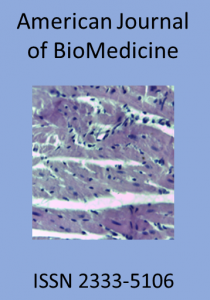American Journal of BioMedicine
Volume 10, Issue 4, December 26 2022, Pages 193-205 | http://dx.doi.org/10.18081/2333-5106/2022.10/193
Chen Luo 1*, Xinxin Liu 1, W.-J. Huang 2, Y.-J. Fang 2, Pingan Luo 1, Zunyou Zheng 1
Received June 12 2022 Revised September 30 2022 Accepted November 09 2022 Published December 26 2022
Abstract
Lung cancer remains the leading cause of cancer death and often diagnosed at an advanced stage because of its speedy growth and early tendency to spread to other organs and tissues The objective of this study focuses on exploring the role of the HJURP/YAP1/NDRG1 transcriptional regulation axis in NSCLC. We observed significantly increased upregulation of HJURP expression levels in NSCLC tissues. Loss of function experiments identified that HJURP promotes NSCLC cells proliferation and decreases chemo-sensitivity. HJURP could affect the level of ubiquitination modification of YAP1 protein and then regulate its downstream transcriptional activity. Mechanistically, we found that YAP1 positively regulates NDRG1 transcription by binding the promoter region of the NDRG1 gene, and HJURP/YAP1/NDRG1 axis could affect chemotherapy sensitivity in NSCLC. Taken together, these findings provide insights into the HJURP as a tumor promoter in NSCLC via the activation of YAP1/NDRG1 axis, indicating HJURP may be a promising therapeutic target for NSCLC.
Keywords: NSCLC; HJURP; YAP1/NDRG1 axis
Copyright © 2022 Chen Luo, et al. This article distributed under the Creative Commons Attribution License, which permits unrestricted use, distribution, and reproduction in any medium, provided the original work is properly cited.
- Lanuti M. Surgical management of lung cancer involving the chest wall. Thorac Surg Clin 2017; 27:195-199. https://doi.org/10.1016/j.thorsurg.2017.01.013
- Johnson DH, Schiller JH, Bunn PA, Jr. Recent clinical advances in lung cancer management. J Clin Oncol 2014; 32: 973-982. https://doi.org/10.1200/JCO.2013.53.1228
- Veronesi G. Lung cancer screening: the European perspective. Thorac Surg Clin 2015; 25:161-174. https://doi.org/10.1016/j.thorsurg.2014.12.002
- She J, Yang P, Hong Q, Bai C. Lung cancer in China: challenges and interventions. Chest 2013; 143:1117-1126. https://doi.org/10.1378/chest.11-2948
- Wu QP, Min JX, Jiang L, Li JM, Yao K. Screening of biomarkers for lung cancer with gene expression profiling data. Eur Rev Med Pharmacol Sci 2013; 17: 3221-3228.
- Perpelescu M, Hori T, Toyoda A, Misu S, Monma N, Ikeo K, Obuse C, Fujiyama A, Fukagawa T. HJURP is involved in the expansion of centromeric chromatin. Mol Biol Cell 2015; 26:2742-2754. https://doi.org/10.1091/mbc.E15-02-0094
- Yousif NG. Fibronectin promotes migration and invasion of ovarian cancer cells through up‐regulation of FAK-PI 3 K/A kt pathway. Cell biology international 2014; 38(1):85-91. https://doi.org/10.1002/cbin.10184
- Kato T, Sato N, Hayama S, Yamabuki T, et al. Activation of Holliday junction recognizing protein involved in the chromosomal stability and immortality of cancer cells. Cancer Res 2007; 67:8544-8553. https://doi.org/10.1158/0008-5472.CAN-07-1307
- Dunleavy EM, Roche D, Tagami H, Lacoste N, Ray-Gallet D, Nakamura Y, et al. HJURP is a cell-cycle-dependent maintenance and deposition factor of CENP-A at centromeres. Cell 2009; 137:485-97. https://doi.org/10.1016/j.cell.2009.02.040
- Serafim RB, Cardoso C, Di Cristofaro LFM, et al. HJURP knockdown disrupts clonogenic capacity and increases radiation-induced cell death of glioblastoma cells. Cancer Gene Ther 2020; 27:319-29. https://doi.org/10.1038/s41417-019-0103-0
- Kang DH, Woo J, Kim H, Kim SY, Ji S, Jaygal G, et al. Prognostic relevance of HJURP expression in patients with surgically resected colorectal cancer. Int J Mol Sci 2020; 21:7928. https://doi.org/10.3390/ijms21217928
- Mohammed KG, Mohammed SM, Hadi N, et al. Association between Natural Killer Cell Cytotoxicity and the Progression of Non-Small Cell Lung Cancer. Sys Rev Pharm 2020; 11(4):543-551. https://doi.org/10.31838/srp.2020.4.81
- Lai W, Zhu W, Xiao C, Li X, Wang Y, Han Y, et al. HJURP promotes proliferation in prostate cancer cells through increasing CDKN1A degradation via the GSK3beta/JNK signaling pathway. Cell Death Dis 2021; 12:583. https://doi.org/10.1038/s41419-021-03870-x
- Chen T, Huang H, Zhou Y, Geng L, Shen T, Yin S, et al. HJURP promotes hepatocellular carcinoma proliferation by destabilizing p21 via the MAPK/ERK1/2 and AKT/GSK3beta signaling pathways. J Exp Clin Cancer Res 2018; 37:193. https://doi.org/10.1186/s13046-018-0866-4
- Zhou X, Li Y, Wang W, Wang S, Hou J, Zhang A, et al. Regulation of Hippo/YAP signaling and esophageal squamous carcinoma progression by an E3 ubiquitin ligase PARK2. Theranostics. 2020; 10:9443-57. https://doi.org/10.7150/thno.46078
- Zhu H, Yan F, Yuan T, Qian M, Zhou T, Dai X, et al. USP10 promotes proliferation of hepatocellular carcinoma by deubiquitinating and stabilizing YAP/TAZ. Cancer Res 2020; 80:2204-16. https://doi.org/10.1158/0008-5472.CAN-19-2388
- Zhang Z, Du J, Wang S, Shao L, Jin K, Li F, et al. OTUB2 promotes cancer metastasis via hippo-independent activation of YAP and TAZ. Mol Cell 2019; 73:7-21.e27. https://doi.org/10.1016/j.molcel.2018.10.030
- Popovic D, Vucic D, Dikic I. Ubiquitination in disease pathogenesis and treatment. Nat Med 2014; 20:1242-53. https://doi.org/10.1038/nm.3739
- Pang D, Wang W, Zhou X, Lu K, Zhang J, Chen Z, et al. RACO-1 modulates Hippo signalling in oesophageal squamous cell carcinoma. J Cell Mol Med 2020; 24:11912-21. https://doi.org/10.1111/jcmm.15811
- Dunleavy EM, Roche D, Tagami H, Lacoste N, Ray-Gallet D., Nakamura Y., Daigo Y., Nakatani Y., et al. Almouzni-Pettinotti G. HJURP is a cell-cycle- dependent maintenance and deposition factor of CENP-A at centromeres. Cell 2009; 137:485-497. https://doi.org/10.1016/j.cell.2009.02.040
- Fang BA, Kovacevic Z, Park KC, Kalinowski DS, Jansson PJ, Lane DJ, et al. Molecular functions of the iron-regulated metastasis suppressor, NDRG1, and its potential as a molecular target for cancer therapy. Biochim Biophys Acta 2014; 1845:1-19. https://doi.org/10.1016/j.bbcan.2013.11.002
- Jung EU, Yoon JH, Lee YJ, Lee JH, Kim BH, Yu SJ, et al. Hypoxia and retinoic acid-inducible NDRG1 expression is responsible for doxorubicin and retinoic acid resistance in hepatocellular carcinoma cells. Cancer Lett 2010; 298:9-15. https://doi.org/10.1016/j.canlet.2010.05.020
- Yan X, Chua MS, Sun H, So S. N-Myc down-regulated gene 1 mediates proliferation, invasion, and apoptosis of hepatocellular carcinoma cells. Cancer Lett 2008; 262:133-42. https://doi.org/10.1016/j.canlet.2007.12.010
- Ito H, Watari K, Shibata T, Miyamoto T, Murakami Y, Nakahara Y, et al. Bidirectional regulation between NDRG1 and GSK3β controls tumor growth and is targeted by differentiation inducing factor-1 in glioblastoma. Cancer Res 2020; 80:234-48. https://doi.org/10.1158/0008-5472.CAN-19-0438

